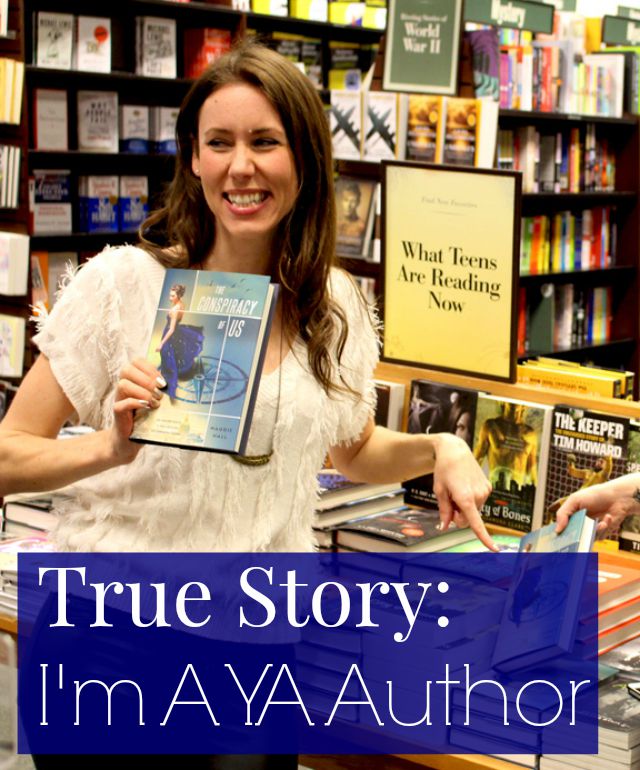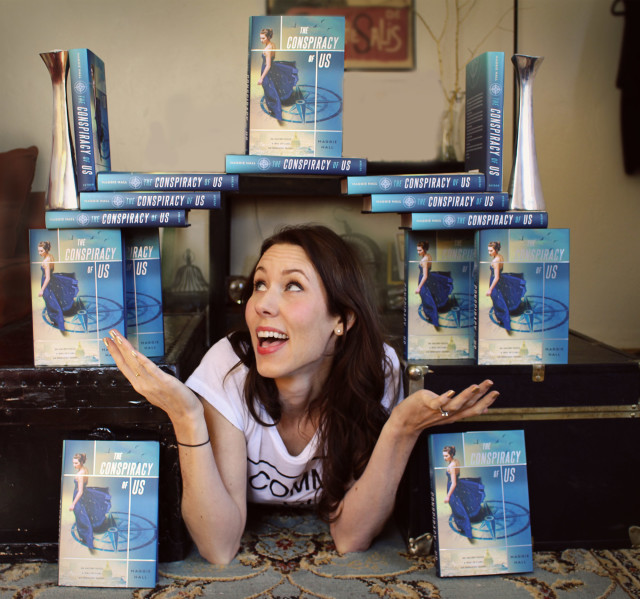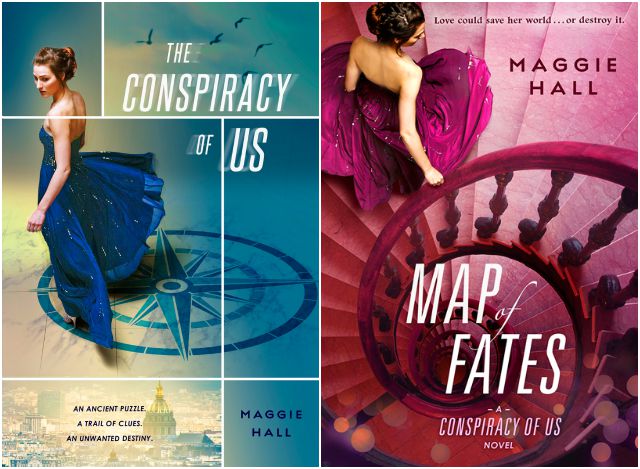
Tell us a bit about yourself!
Hi! I’m Maggie Hall, I’m 32 years old, and I live in Albuquerque, New Mexico with my husband and our two cats. I grew up in Albuquerque, went to college in LA (Fight on, USC!), lived in New Orleans with stints elsewhere, and have traveled a lot in between. My husband and I just spent a year traveling around the world.
I’m currently a full-time writer and part-time graphic designer. My first book, The Conspiracy of Us, is the first in a young adult international thriller trilogy (kind of like a teen DaVinci Code), and the second in the trilogy, Map of Fates, comes out March 2016.
How did you come to be a YA author?
After college, I worked in marketing and events at an independent bookstore. This probably should have discouraged me from writing, because it taught me how hard the publishing world is, but somehow, it was the opposite. It fascinated me. At the same time, I heard about this thing called NaNoWriMo (National Novel Writing Month), which is where you write a whole novel in one month. I didn’t end up writing Conspiracy during NaNo, but the idea that it was something a person could do even if they hadn’t been writing since they could hold a pen and didn’t have an MFA or connection to the literary world inspired me to start thinking about it.
Around the same time, I started reading YA, but I could never find the exact book I wanted to read. I loved conspiracy thrillers, and I loved travel, and I loved YA romance…and at some point, it came together in my head. This was the book I wanted to read, and it didn’t exist—so I’d write it.
In your opinion, how is writing YA fiction different than writing ‘traditional’ fiction?
It’s hard to generalize YA, because it’s so diverse—it’s not a genre, but an age group that encompasses every genre. I do think YA has some commonalities, though. It tends to be very plot-driven or very character-driven, or both, which makes it easy to read, and I mean that in the best possible way. Even on the more literary end of the YA spectrum, you’re usually not going to find YA where nothing much happens.
Also, YA tends to have a stronger emotional core than some adult fiction. Since YA characters are teenagers, so many experiences are new to them. For me, this is one of the most fun parts to write: everything that happens matters so much.
Have you encountered any snarkiness or condescension from writers who write for adults?
I haven’t experienced this personally. Authors tend to be really cool people, and they understand that writing and publishing is a huge undertaking no matter what you write. I’ve actually encountered more of this from certain non-writers who think every YA book is just a ripoff of the Twilight movies.
Signing a three-book deal with Penguin for your first book is a huuuuge deal! Can you walk us through that process?
The typical process to try for publication with a major publisher (for fiction—non-fiction is a little different) goes like this:
1. Write the book. If you’re a debut author and not famous, you must have the book finished—there’s no selling on ideas at this stage if you’re a newbie.Query literary agents. Here, you’re seeking a literary agent to represent you, as they are the only ones who can submit to major publishers (they don’t accept unsolicited manuscripts directly from authors). This part of the process can take a long time, and it’s very common for an author to not get an agent on their first (or second, or fifth) book.
2. Submission. Once you’ve secured representation, your agent will send the book out on submission. This involves choosing editors at various publishers the agent thinks might be interested in the book, and then sending it out. Like the query stage, it can sometimes take a while.
3. Accept an offer. If an editor is interested, and the publisher wants to buy the book, you have a book deal! At this stage, your agent negotiates various things, such as how many books the deal is for, the advance you’ll be paid, etc.
As for my experience…Conspiracy Of Us was my first book. I worked on it for a couple years from idea to querying (which seemed like forever!). I got an agent pretty quickly, but then I edited with her for a few months before going on sub. I was on submission for six days, but then it was two years until publication! My deal was for three books, because I knew going in that CONSPIRACY would be a trilogy, and luckily, Penguin agreed.
What does a typical ‘work’ day look like for you?
I’m not on quite as strict a schedule as I’d like to be, but my schedule lately (on a revision deadline) goes something like this:
5:30 am – Wake up to a cat in the face, and go straight to the computer either at home, or out at a coffee shop. I make myself a revision to-do list the night before, and now I work through as much of it as I can.
8 am – Go for a walk or run, eat breakfast, get ready for the day.
10 am – More editing, or sometimes design stuff.
1 pm – Realize I’ve allowed myself to turn the internet back on to research a fact, then accidentally spent the last half-hour reading about what Brad and Angelina got the twins for their birthday. Oops. Eat lunch with my husband (who also works from home) and spend the next couple hours running errands, doing stuff around the house, etc. I’m terribly unproductive at this time of day, so I try to schedule things that aren’t writing.
4 pm – Work on a graphic project or two. Lately I’ve been doing a lot of book covers.
6 pm – Make dinner, maybe watch a TV show.
7:30 pm – Back to work! Early and late in the day are when I do my best writing work. (Though if I’m not on a tight deadline, sometimes I’ll take the night off.) 😉
Where do you find creative inspiration?
Well-written books. Great TV. (There’s so much good TV these days!) Stories in general.
Have you ever suffered from writer’s block?
I do, and I find it’s usually from one of two things: something’s wrong with what I’m writing, or I’m being lazy. If I’m being lazy and resisting the huge amount of work I to have to do, a deadline will generally snap me out of it. But if I’m really stuck on a storyline, or I have no idea what should come next, I go back as far as I need to until I find where I took a wrong fork in the road, and fix it.
What tools/apps/platforms/coping techniques have helped you write these books?
Scrivener (a word processer that’s a zillion times better than Word for novel writing—seriously, if you’re a writer, GET IT).
A small notebook I keep with me all the time, including by my bed at night, just in case anything pops into my head.
Whiskey. (That’s a valid coping technique, right?)
There’s a lot of talk about how the publishing world is changing and authors are expected to do more of their own marketing, etc. What things have you, yourself, done to promote your book?
That’s true—I think almost all authors are expected to do at least some of their own marketing. I personally find the best way to promote is to connect with readers in whatever way I can. Whether that’s doing events (I got to go on tour with a few other Penguin authors earlier this year, and have also done a few events on my own) or by interacting on social media, or by doing giveaways, I really love talking to readers.
What surprised you about the process of writing these books?
How much the characters become real to you. It’s not surprising, I guess—I sometimes spend way more time with them than with real-life people! And also, how LONG the whole process takes.
Who are some of your literary idols?
Is it too obvious to say JK Rowling? I am obsessed with her ability to tie details and storylines together from book to book. Keeping all that together in your head for three books feels impossible some days—I can’t imagine seven!
Also Hemingway—his writing style is not my thing, but I love that he lived as fascinating a life as he wrote about.
What advice would you give to others who are trying to get published?
Write something, and finish it. So many people mess around with one chapter for five years and give up because they can’t get it quite right. As much as writing is an art, if you want to get published it’s also a business. And if publication doesn’t come easily, don’t give up! I’m an anomaly having gotten my first book published. If you don’t, it doesn’t mean you don’t have what it takes. It just means this book wasn’t quite right for agents or publishers at this time—but your next one might be.
Thanks so much for sharing, Maggie! Do you guys have any questions for her?















This is a fantastic interview. Congratulations Maggie! Writers impress me so much. First the hardship of writing an entire book then the publishing process, Whoa. I’m going to have to read your books and add them to my book blog. I love books with travel elements.
Thanks, Tricia! I’m excited to look through your blog, too–it looks amazing!
thanks! Any recommendations on writing conferences?
I haven’t gone to a lot of writing conferences, but I always recommend starting with one close to you to see if they’re your thing without spending too much money. Then if you enjoy it, you can look into bigger ones. (I tend to know more about children’s/YA conferences and romance, and I’m not sure if that’s what you’re looking for, but you can find tons of info online.) Conferences are always fun for meeting other writers, no matter where you go!
Thanks for the info!
I loved this interview! I am always so curious about writers and have so much admiration for people who have written a book. I also love YA so I will definitely have to check Maggie’s book out.
Thanks for reading, Chloe! I know–this series is so fun. I’ve gotten to read about so many things I’ve always been curious about, and it’s so neat to be on the other side. 🙂
Sarah, is there any way to get notifications of comments/reply comments via email?
Not yet – though I’m hoping to switch to Disqus soon!
I use Disqus on one of my sites. It works wonderfully.
Maggie, you said that lately you have been designing covers? Any advice for a graphic designer wanting specialize in covers and going about getting their first job?
As with any design work, you’re probably going to need to have some examples in your portfolio before someone will hire you (as I’m sure you know!). Since covers are such a specific thing, and my other design work couldn’t really speak to my skills as a cover designer specifically, I started out doing covers no one was going to actually use (covers for books that weren’t even really books, that I just made up) to build my portfolio. And at that point, it’s about finding clients. Are any of your current design clients in a position to need covers, or know anyone who is? I started off designing covers for people I knew, and my client list has grown mostly through word of mouth so far.
Good luck!
I do have a portfolio at jenniferdesignsthings.com . and I do have examples of cover but they are for bulletins at my current day job for a publications company. I think I am just having trouble finding clients that need, specifically, book covers done. I am on the site upwork, so I will keep looking there. I will also take up your suggestion and make some examples of ‘fake’ book covers also. Thanks for the tip!